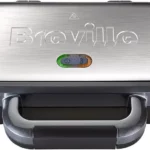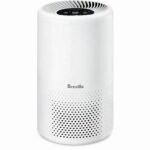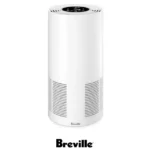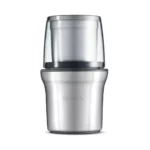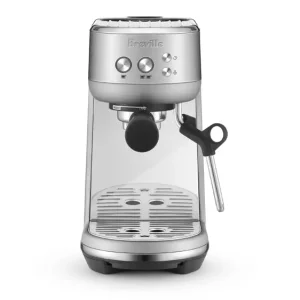
 the Bambino™
the Bambino™
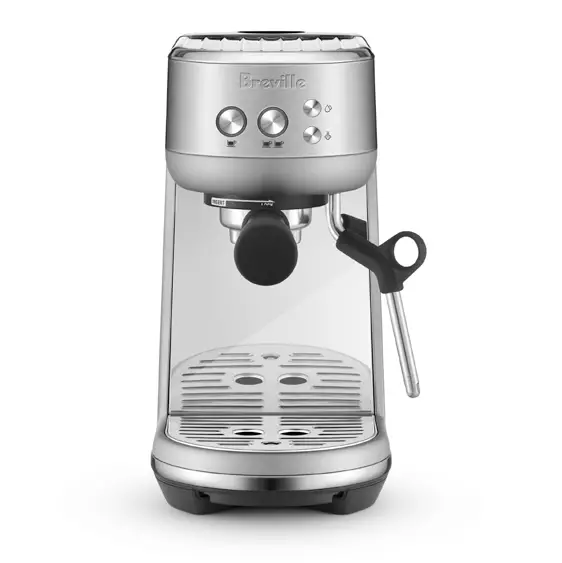
BREVILLE RECOMMENDS SAFETY FIRST
At Breville, we are very safety conscious. We design and manufacture consumer products with the safety of you, our valued customer, foremost in mind. In addition, we ask
that you exercise a degree of care when using any electrical appliance and adhere to the following precautions.

IMPORTANT SAFEGUARDS
READ ALL INSTRUCTIONS BEFORE USE AND SAVE THEM FOR FUTURE REFERENCE
- Carefully read all instructions before operating and save for future reference.
- Do not touch hot surfaces. Use handles or knobs as advised in this instruction book.
- To protect against fire, electric shock, and injury to persons do not immerse the power cord, plug, or appliance itself in water or other liquids.
- Close supervision is necessary when any appliance is used by or near children.
- Unplug from outlet when not in use and before cleaning. Allow cooling before putting on or taking off parts and before cleaning the appliance.
- It is recommended to regularly inspect the appliance and power cord. Do not use the appliance if there is damage to the power cord or plug, or after the appliance malfunctions or has been damaged in any way. Immediately stop use and call Breville Consumer Support.
- The use of accessory attachments not recommended by Breville may result in fire, electric shock or injury to persons.
- Do not let the power cord hang over the edge of a table or countertop or touch hot surfaces.
- Do not place the appliance near the edge of a table or countertop. Ensure the surface is level, clean, and free of water and other substances.
- Do not place the appliance on or near a hot gas or electric burner.
- Do not place it in or allow it to come in contact with a heated oven.
- This appliance is recommended for household use only. Do not use this appliance for anything other than its intended use. Do not use outdoors. Do not use in moving vehicles or boats.
NOTICE TO CUSTOMERS REGARDING MEMORY STORAGE - Please note that in order to better serve our customers, internal memory storage has been embedded into your appliance. This memory storage consists of a small chip to collect certain information about your appliance including the frequency of use of the appliance and the manner in which your appliance is being used. In the event your appliance is returned for service, the information collected from the chip enables us to quickly and efficiently service your appliance. The information collected also serves as a valuable resource in developing future appliances to better serve the needs of our consumers. The chip does not collect any information regarding the individuals who use the product or the household where the product is used. If you have any questions regarding the memory storage chip, please contact us at [email protected]
SPECIFIC INSTRUCTIONS FOR BES450 - This appliance is recommended for household use only. Do not use this appliance for anything other than its intended use. Do not use in moving vehicles or boats. Do not use outdoors. Misuse may cause injury.
- If the appliance is to be:
−left unattended
−cleaned
−moved
−assembled; or
−stored, always switch Off the espresso machine by simultaneously pressing the 1 CUP and HOT WATER buttons. Unplug from the power outlet. - Ensure the product is properly assembled before first use.
- Do not use any other liquid apart from cold mains/tap water. We do not recommend the use of highly filtered, demineralized, or distilled water as this may affect the taste of the coffee and how the espresso machine is designed to function.
- Do not leave the product unattended when in use.
- Do not touch hot surfaces. Allow the product to cool down before moving or cleaning any parts.
- Use caution when operating the machine, as metal surfaces are liable to get hot during use.
 WARNING
WARNING
To avoid the risk of injury, use caution when descaling, as hot steam may be released. Before descaling, ensure a drip tray is inserted. Refer to ‘Care & Cleaning’ for further instructions. Ensure the portafilter is firmly inserted and secured into the group head before starting the extraction. Never remove the portafilter during the brewing process.
 WARNING
WARNING
To avoid the risk of injury, do not open the brew chamber during the brewing process.
 WARNING
WARNING
Do not place the portafilter, the tamper or any parts of the appliance in the dishwasher.
 WARNING
WARNING
Do not immerse the power cord, power plug or any parts of the appliance or the appliance in water or any other liquid.
 WARNING
WARNING
Misuse may cause injury.
SHORT CORD INSTRUCTIONS
- Your Breville appliance is fitted with a short power cord to reduce personal injury or property damage resulting from pulling, tripping, or becoming entangled with a longer cord. Longer detachable power cords or extension cords are available and may be used if care is exercised. If an extension the cord is used,
1. the marked electrical rating of the cord set, or the extension cord should be at least as great as the electrical rating of the appliance,
2. the cord should be arranged so that it will not drape over the counter-top or table where it can be pulled on by children or tripped over unintentionally and
3. the extension cord must include a 3-prong grounding plug.
BREVILLE ASSIST™ PLUG
- Your Breville appliance comes with a unique Assist™ Plug, conveniently designed with a finger hole to ease removal from the power outlet.
CSA DUTY CYCLE MARKING
- The Canadian Standards Authority requires any appliances capable of drawing over 1500W to be marked with a ‘duty cycle’ in minutes. For the BES450, this ‘duty cycle’ represents the maximum time for which the appliance will draw over 1500W during any 2-hour period of use. It does not indicate the appliance is unsafe for continuous use or is required to be switched off at certain intervals during normal use.
FOR HOUSEHOLD USE ONLY SAVE THESE INSTRUCTIONS

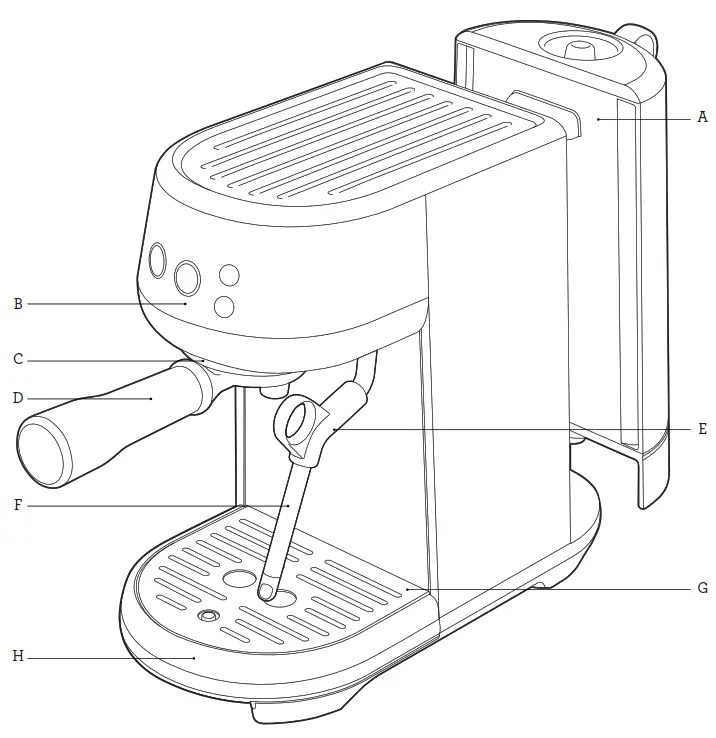
| A. 47 fl.oz (1.4L) removable water tank B. Control panel 1 CUP, 2 CUP, hot water, steam buttons C. Group head D. 54mm aluminum portafilter (WARNING: NOT dishwasher safe) |
E. Steam wand grip F. Steam wand G. Removable drip tray grid H. Removable drip with full indicator |
Rating Information
120 V ~ 60 Hz 1560 W
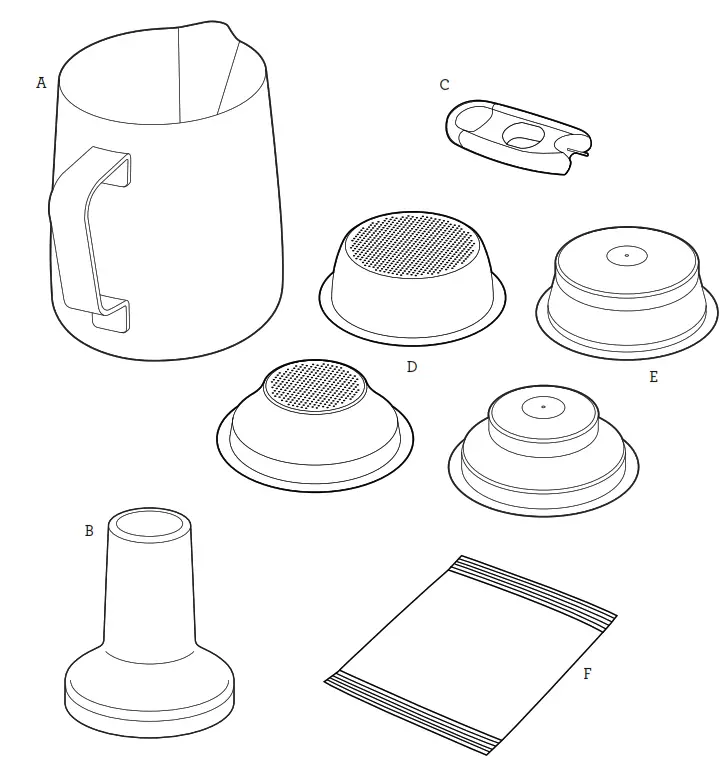
ACCESSORIES
| A. Stainless steel milk jug B. 54mm tamper (Note: Do not submerge in water or any liquid) C. Steam wand tip cleaning tool (Located under the water tank) |
D. Single Wall filter baskets (1 cup & 2 cup) E. Dual wall filter baskets (1 cup & 2 cup) F. Descaling powder |

COMPACT FOOTPRINT
Cafe quality coffee in a compact machine.
MANUAL MILK TEXTURING
Manually textures milk from silky smooth latté
to creamy cappuccino.
THERMOJET ™ TECHNOLOGY
The innovative heating system achieves an ideal extraction temperature in 3 seconds.
PID TEMPERATURE CONTROL
Electronic PID temperature control for increased temperature stability.
LOW-PRESSURE PRE-INFUSION
Applies low water pressure at the start of the extraction to gently expand grinds for an even extraction.
VOLUMETRIC CONTROL
Preset 1 & 2 cup volumes, manual over-ride or programmable shot volumes.
INSTANT HOT WATER
Hot water outlet via the steam wand for making Americanos and pre-heating cups.
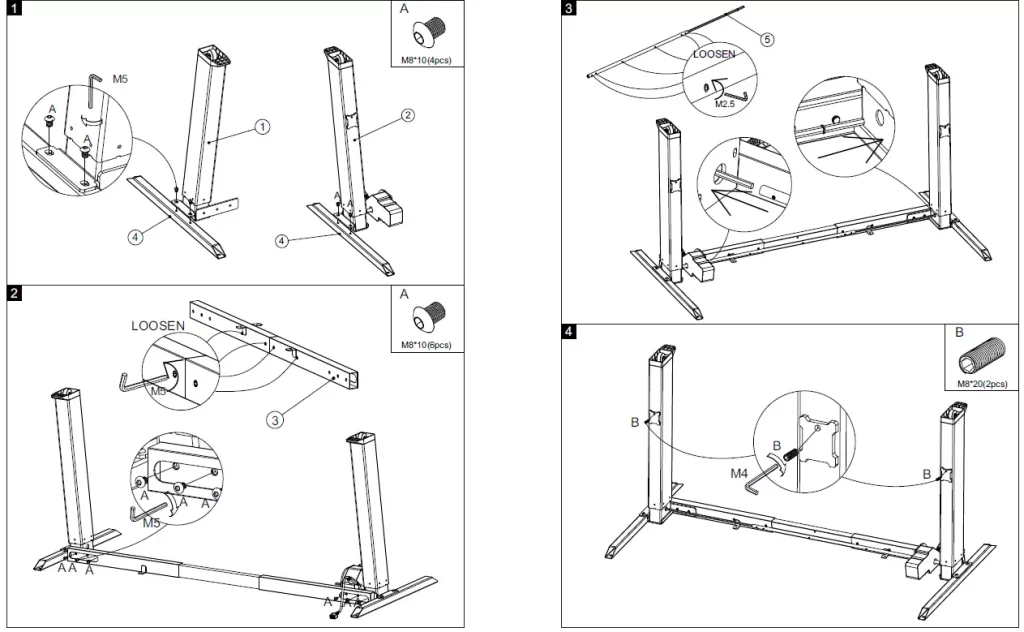
Machine Preparation
Remove and discard all labels and packaging materials attached to your machine. Ensure you have removed all parts and accessories before discarding the packaging. Clean the drip tray, drip tray grid, portafilter, filter baskets using warm water and a gentle dishwashing liquid. Rinse well and dry thoroughly before use.
BEFORE FIRST USE
Machine Preparation
Remove and discard all labels and packaging materials attached to your machine. Ensure you have removed all parts and accessories before discarding the packaging.
Clean the drip tray, drip tray grid, portafilter, filter baskets using warm water and a gentle dishwashing liquid. Rinse well and dry thoroughly before use.

FIRST USE
- Remove the water tank and fill it with potable water to the indicated MAX line. Place the water tank back firmly onto the machine.
- Ensure that the drip tray is firmly placed on the machine.
- Place a 17 fl. oz (500ml) container under the portafilter and steam wand for the water drips for this first cycle.
- Plug the power cord in the power outlet, and the 1 Cup button illuminates.
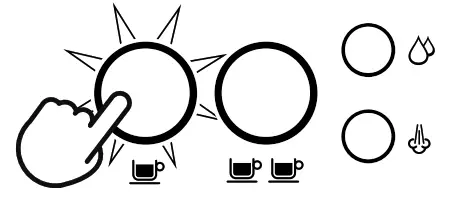
- Press the 1 Cup button to begin the first use cycle.
![]() NOTE
NOTE
The first use cycle is to rinse the machine and prime the heating system.
STANDBY MODE
To turn off the operation and enter standby mode, press the 1 Cup and Hot Water buttons for 0.5 seconds simultaneously.
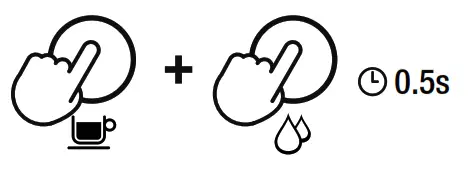
![]() NOTE
NOTE
The unit will enter ‘standby mode’ when idle or no interaction from the user after 10 minutes.
FILLING THE WATER TANK
Lift the water tank from the machine.
Remove the water tank lid and add potable water to the water tank, filling to the MAX marking indicated.
Replace the water tank onto the machine, press down ensuring it is properly attached and sitting flush against the back of the machine.
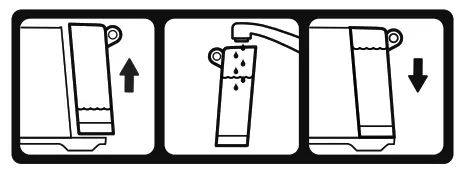
![]() NOTE
NOTE
Machine LED lights will flash 6 times for 3 seconds when no water is detected in the water tank.
FILTER BASKETS
Single Wall Filter Baskets Use Single Wall filter baskets if grinding fresh whole coffee beans.
Single Wall filter baskets allow you to experiment with grind, dose, and tamp to create a more balanced espresso.
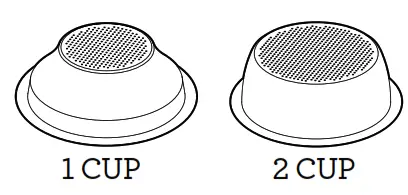
Dual Wall Filter Baskets
Use Dual Wall filter baskets if using preground coffee. Dual Wall filter baskets regulate the pressure and help to optimize the extraction regardless of the grind, dose, tamp pressure or freshness. 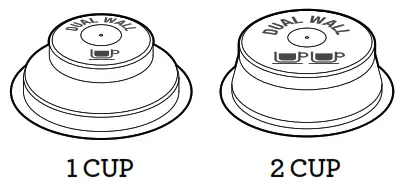
![]() NOTE
NOTE
Regardless of whether you use Single Wall or Dual Wall filter baskets, use the 1 CUP basket when brewing a single cup and the 2 CUP basket when brewing two cups or a stronger single cup or mug.
Use the 1 cup filter basket when brewing a single cup and the 2 cup filter baskets when brewing 2 cups or a stronger single cup or mug.
You will need to adjust the grind amount and size if switching from a single basket to a double basket, or vice versa.
The provided filter baskets are designed for:
1 Cup filter basket = 8-11g
2 Cup filter basket = 16-19g
THE GRIND
When grinding coffee beans, the grind size should be fine but not too fine. The grind size will affect the rate at which the water flows through the ground coffee in the filter basket and the taste of the espresso.
If the grind is too fine (looks like powder and feels like flour when rubbed between the fingers), the water will not flow through the coffee even when under pressure. The resulting espresso will be OVER EXTRACTED, dark in color and bitter in flavor.
If the grind is too coarse, the water will flow through the ground coffee in the filter basket too quickly. The resulting espresso will be UNDER
EXTRACTED and lacking in color and flavor.
COFFEE DOSE AND TAMPING
- Insert the filter basket into the portafilter.
- Grind enough coffee to fill the filter basket.
- Tap the portafilter several times to collapse and distribute the coffee evenly in the filter basket.
- Using the tamper, tamp down firmly (approx. 30-40 lbs. (15-20kgs) of pressure). The amount of pressure is not as important as the consistent pressure every time.
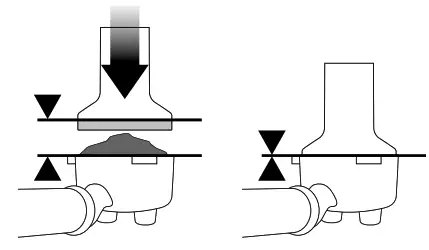 As a guide, the top edge of the cap on the tamper should be level with the top of the filter basket AFTER the coffee has been tamped.
As a guide, the top edge of the cap on the tamper should be level with the top of the filter basket AFTER the coffee has been tamped.
![]() NOTE
NOTE
We recommend quality 100% Arabica beans with a ‘Roasted On’ date stamped on the bag, not a ‘Best Before’ or ‘Use By’ date. Coffee beans are best consumed between 5–20 days after the ‘Roasted On’ date. Stale coffee may pour too quickly from the portafilter spouts and taste bitter and watery.
PURGING THE GROUP HEAD
Before placing the portafilter into the group head, run a short flow of water through the group head by pressing the 1 Cup or 2 Cup button. This will stabilize the temperature prior to extraction.
INSERTING THE PORTAFILTER
Place the portafilter underneath the group head so that the handle is aligned with the INSERT position. Insert the portafilter into the group head and rotate the handle towards the center until resistance is felt.
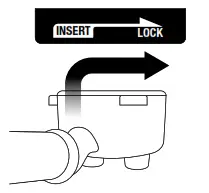 Place your cup/s under the portafilter on the drip tray.
Place your cup/s under the portafilter on the drip tray.
EXTRACTING ESPRESSO
As a guide, the espresso will start to flow after 8-12 seconds (infusion time) and should be the consistency of dripping honey. If the espresso starts to flow after less than
7 seconds, either under-dose the filter basket or the grind is too coarse. This is an UNDER EXTRACTED shot.
If the espresso starts to drip but doesn’t flow after 12 seconds, the grind is too fine. This is an OVER EXTRACTED shot.
PRE-PROGRAMMED SHOT VOLUME
– 1 CUP Press the 1 Cup button for less than 1 second, the button will flash indicating that it has been selected. A preset single espresso volume of approximately 30ml will be extracted. The machine will automatically stop once the pre-set volume has been extracted.
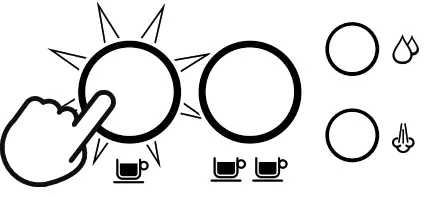
PRE-PROGRAMMED SHOT VOLUME – 2 CUP
Press the 2 Cup button for less than a second, the button will flash indicating that it has been selected. A preset double espresso volume of approximately 60ml will be extracted. The machine will automatically stop once the pre-set volume has been extracted.
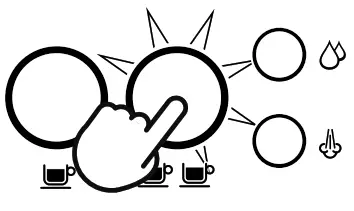
![]() NOTE
NOTE
Pressing the corresponding 1 Cup or 2 Cup button during the programmed espresso extraction will immediately stop the extraction.
PROGRAMMING COFFEE VOLUME
Press and hold the 1 Cup and 2 Cup buttons for 2 seconds, the buttons will illuminate and flash.
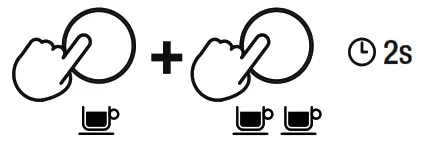
To set the 1 Cup volume:
- Press the 1 Cup button for about 3 seconds to start the extraction.
- Press the 1 Cup button again to stop the extraction. The modified volume will be saved. To set the 2 Cup volume, follow the above steps and select the 2 Cup button to start and stop the extraction.
![]() NOTES
NOTES
- If no user input after 30 seconds. The machine returns to ‘ready mode’
- The modified coffee volume will be saved into memory for the next use or when the machine is restarted.
- Pressing the steam or hot water button at any stage will cancel the operation and the machine will return to ready mode without saving any coffee volume program.
MANUAL PRE-INFUSION AND SHOT VOLUME
Press and hold the 1 Cup or 2 Cup button for more than a second. After one second the pump will start at pre-infusion pressure and continue while the button is pressed. Release the button to start the extraction. Press any button again to stop the extraction.
MANUAL MILK TEXTURING
- Lift the steam wand and insert into the milk jug with the steam wand tip 3/4 inch (1-2cm) below the surface of the milk, close to the right-hand side of the jug at a 3 o’clock position.
- Press the STEAM button to begin texturing
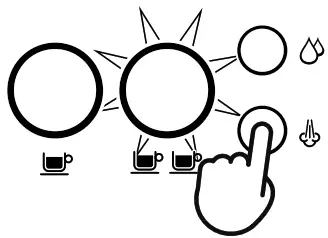
- Keep the steam wand tip just under the surface of the milk until the milk is spinning clockwise, producing a vortex (whirlpool effect).
- With the milk spinning, slowly lower the jug. This will bring the steam wand tip to the surface of the milk and start to introduce air into the milk.
- Gently break the surface of the milk with the tip to get the milk spinning fast enough.
- Keep the steam wand tip at or slightly below the surface, continuing to maintain the vortex. Texture the milk until sufficient volume is obtained.
- Lift the jug to lower the tip beneath the surface but keep the vortex spinning. The milk is at the correct temperature 140-149 F (60-65°C) when the jug is hot to touch.
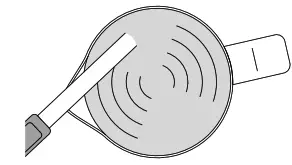
- When texturing is close to acceptable desired the result, press any button to stop texturing.
- After the steam is released completely, remove the steam wand from the milk jug.
- Wipe the wand and tip with a clean damp cloth.
STEAM WAND MANUAL PURGE
To reduce steam wand blockages, we recommend running steam through the steam wand after milk texturing. Lower and point steam wand directly on drip tray and away from users and press the steam button to run steam to rinse steam wand, or press and hold the steam button for 3 seconds, to activate the steam wand purge. This will run short water pulses through the steam wand.
![]() NOTE
NOTE
Both 1 Cup and 2 Cup buttons will blink during the steam purge function.
 WARNING
WARNING
After pressing steam button, the steam can’t stop immediately, it needs a few seconds to completely stop steam.
STEAM WAND BLOCKED
Regularly check steam performance. If the steam wand is blocked, it will immediately stop operating. See ‘Cleaning the Steam Wand’ for further instructions.
HOT WATER OPERATON
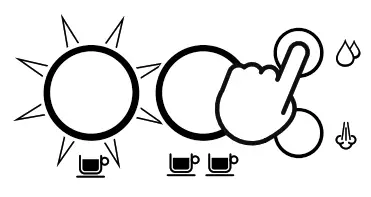 Hot water through the steam wand When the machine is on ‘ready mode’, press hot water button, and hot water flow will start through the steam wand. Press any button to stop hot water flow.
Hot water through the steam wand When the machine is on ‘ready mode’, press hot water button, and hot water flow will start through the steam wand. Press any button to stop hot water flow.
 WARNING
WARNING
Cup temperature is at 194°F (90°C). Be careful in handling hot beverages.
EXTRACTION TIPS
A great espresso is about achieving the perfect balance between sweetness, acidity, and bitterness. The flavor of your coffee will depend on many factors, such as the type of coffee beans, degree of roast freshness, coarseness or fineness of the grind, dose of ground coffee and tamping pressure. Experiment by adjusting these factors just one at a time to achieve the taste of your preference.
CORRECT EXTRACTION
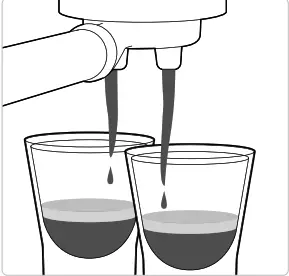
- The flow starts after 8–12 secs
- Flow slowly like warm honey
- Crema is golden brown with a fine mousse texture
- Espresso is dark brown
AFTER EXTRACTION
REMOVE USED
GRINDS
Used grinds will form a coffee ‘puck’. If the puck is wet, refer to the ‘Under Extraction’ section.
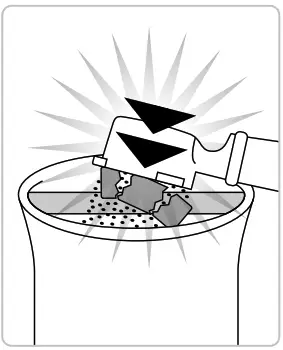 RINSE FILTER
RINSE FILTER
BASKET
Keep the filter basket clean to prevent blockages. Without ground coffee in the filter basket, lock the portafilter into the machine and run hot water through.
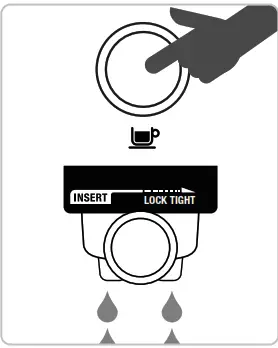
UNDER EXTRACTION
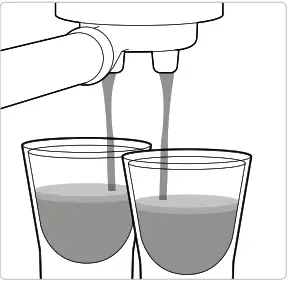
- The flow starts after 1– 6 secs
- Flow fast like water
- Crema is thin and pale
- Espresso is pale brown
- Tastes bitter/sharp, weak, and watery
SOLUTIONS
EXPERIMENT WITH GRIND:
- The grind needs to be finer for a slower extraction.
- Ensure you are controlling the dose.
Adjust & re-test
Tamp using 30-40 lbs (15–20kg) of pressure. The top edge of the cap on the tamper should be level with the top of the filter basket AFTER tamping.
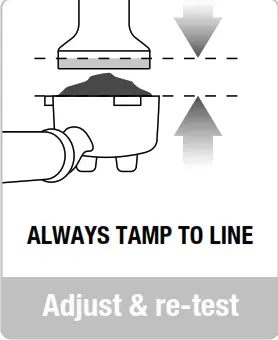 OVER EXTRACTION
OVER EXTRACTION
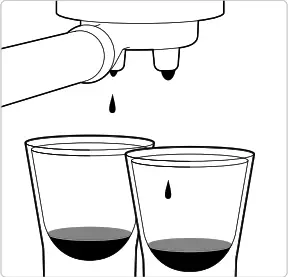
- The flow starts after 12 secs
- Flow drips or not at all
- Crema is dark and spotty
- Espresso is very dark brown
- Tastes bitter and burnt
SOLUTIONS
EXPERIMENT WITH GRIND:
- Grind needs to be coarser for faster extraction.
- Ensure you are controlling the dose.
Adjust & re-test
Tamp using 30-40 lbs (15–20kg) of pressure. The top edge of cap on the tamper should be level with the top of the filter basket AFTER tamping.

| GRIND | GRIND DOSE | TAMP | |
| OVER EXTRACTED BITTER • ASTRINGENT |
Too fine | Too much Decrease dose |
Too heavy |
| BALANCED | Optimum | 8-11g (1 Cup) 16-19g (2 Cup) |
30-40 lbs. (15-20kgs) |
| UNDER EXTRACTED UNDERDEVELOPED • SOUR |
Too coarse | Too little Increase dose |
Too light |

CLEAN & DESCALE CYCLE
The Bambino Espresso machine requires regular cleaning and descaling and the machine will flag when it is expected for a clean. The 2 Cup button will continuously flash; the ndicating machine will need cleaning and descaling.
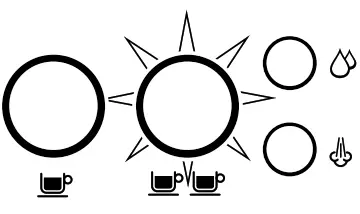
![]() NOTE
NOTE
Pressing any of the buttons will cancel the alert and return the machine to ready mode.
 WARNING
WARNING
It is NOT recommended to ignore the clean cycle warning because, after regular use, hard water can cause mineral build-up in and on many of the inner functioning components, reducing the brewing flow, brewing temperature, power of the machine, and the taste of the espresso.
 WARNING
WARNING
Do not immerse the power cord, power plug or appliance in water or any other liquid. The water tank should never be removed or completely emptied during descaling.
TO PERFORM A CLEAN & DESCALE CYCLE
- Empty the drip tray and re-insert it firmly into position on the machine.
- Fill the water tank to the DESCALE line indicated and add the descaling agent to the water.
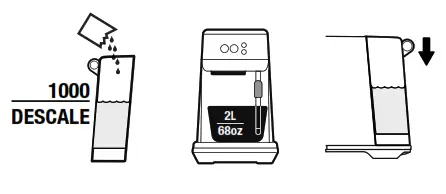
- Place a 2L / 68 fl.oz container under the group head and steam wand.
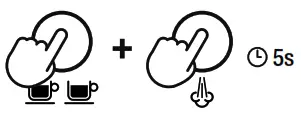
- Press the 2 Cup and Steam buttons simultaneously for 5 seconds to start descaling.

 NOTE
NOTE
The 2-Cup button will flash throughout the cycle. - Once the descaling solution has been used up the descaling mode will pause.
- Rinse and refill the water tank to the MAX line and empty the wastewater container, then replace both parts onto the machine to proceed onto the rinse cycle.
- Press the 2 Cup button to proceed to the rinse cycle.
- When the rinse cycle is complete, the machine will then go into ready mode.
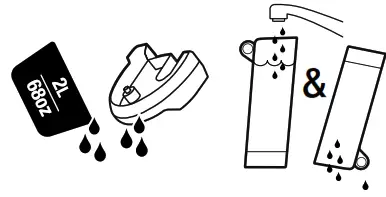
- Remove and empty the wastewater container. Rinse the drip tray and water tank and dry thoroughly before replacing them back onto the machine.
 CLEANING THE STEAM WAND
CLEANING THE STEAM WAND
- The steam wand should always be cleaned after texturing milk. Wipe the steam wand with a damp cloth.
- If any of the holes in the tip of the steam wand become blocked, it may reduce frothing performance. Manually purge the steam want to try and clear the holes.
- If the steam flow is very small and the steam wand is still blocked, unscrew the steam wand tip using the steam tip cleaning tool, then use the tool to unblock the holes; the cleaning tool is located in the back of the machine, under the water tank.
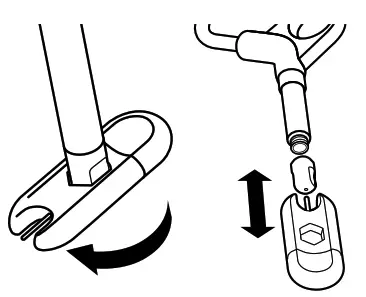
Rinse the steam tip and wipe with a clean, dry cloth. Reassemble the steam wand by screwing the steam tip back onto the steam wand. Purge the steam wand after cleaning.
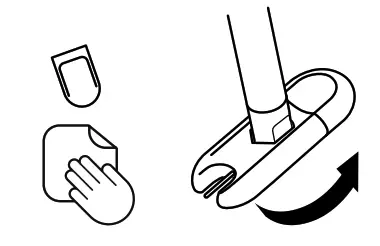
GROUP HEAD RINSE
- Press the‘ 2 Cup’ button to flow the freshwater flush cycle.
CLEANING THE FILTER BASKETS AND PORTAFILTER - The filter baskets and portafilter should be rinsed under hot water directly after use to remove all residual coffee oils.
- If the holes in the filter baskets become blocked, use the steam wand cleaning tool to unblock the holes.
 WARNING
WARNING
Do not put a portafilter in the dishwasher.
CLEANING THE SHOWER SCREEN
- The group head interior and shower screen should be wiped with a damp cloth to remove any ground coffee particles.
- Periodically run hot water through the machine with the filter basket and portafilter in place, without any ground coffee, to rinse out any residual coffee.
CLEANING THE DRIP TRAY
The drip tray should be removed, emptied and cleaned after each use or when the drip tray indicator rises through the drip tray grid.
Remove the drip tray grid and wash both parts in warm soapy water.
CLEANING THE OUTER HOUSING
- Wipe the outer housing with a soft, damp cloth and then polish with a soft, dry cloth.
![]() NOTE
NOTE
Do not use any abrasive cleaners, pads or cloths which can scratch the surfaces of the machine.
![]() NOTE
NOTE
Do not clean any of the parts or accessories in the dishwasher.
 WARNING
WARNING
Do not immerse the power cord, power plug, plastic tamp or machine in water or any other liquid.
STORING YOUR MACHINE
Before storing, turn the machine off, switch off and remove the power plug from the power outlet. Empty the water tank and drip tray and ensure the machine is cool, clean and dry. Store in an upright position.
Do not place anything on top of the machine.
RESET FACTORY ESPRESSO VOLUME SETTINGS
- When the machine is on standby mode
- Press and hold the 1 Cup and 2 Cup buttons for 10 seconds to enter the Factory reset mode.
- The lights will flash 3 times to indicate that all volumes have been reset.
- The machine will then return to ready mode.
 NOTE
NOTE
When the machine is turned on after reset, it enters directly to ready mode.
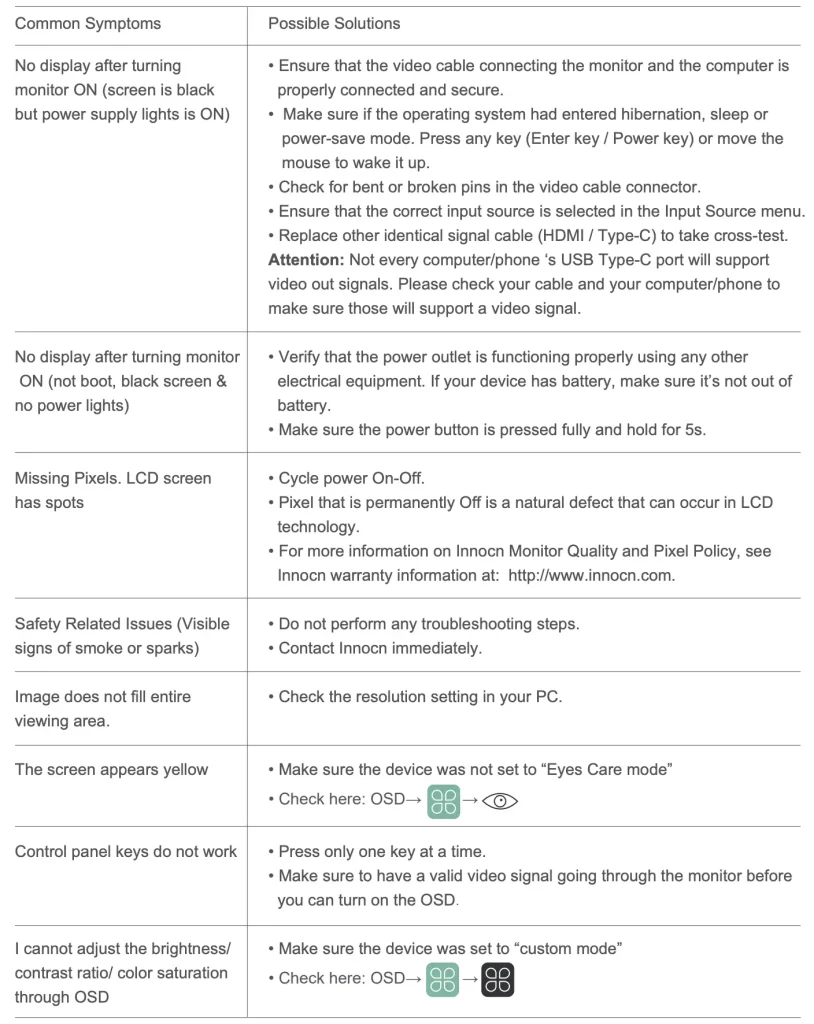
| PROBLEM | POSSIBLE CAUSES | EASY SOLUTION |
| Water does not flow from the group head. No hot water. | • Water tank is empty. • Water tank is not fully inserted and locked into position. • Machine needs to be cleaned & descaled.• Coffee is ground too finely and/or too much coffee in the filter basket and/or over tamping and/or filter basket is blocked. |
• Fill the tank. • Push the water tank down completely to lock into place. • Perform clean & descale cycle. • See below, ‘Espresso only drips from the • portafilter spouts or not at all. |
| Espresso only drips
from the portafilter spouts or not at all. |
• Coffee is ground too finely. • Too much coffee in the filter basket. • Coffee tamped too firmly. • Water tank is empty. Fill tank. • Water tank is not fully inserted and locked into position. • The filter basket may be blocked. • Machine needs to be cleaned & descaled. |
• Use slightly coarser grind. Refer to ‘Coffee Dose and Tamping’ on page 11 and ‘Extraction Tips’ on page 14. • Lower dose of coffee. • Tamp between 30-40 lbs (15-20kgs) of pressure. • Fill the tank. • Push the water tank down completely to lock into place. • Use the pin on the end of the provided cleaning tool to unblock the hole(s). • Perform clean & descale cycle |
| Water doesn’t come through (the machine makes a loud noise). | • Water tank is empty | • Fill tank |
| Espresso runs outtoo quickly | • Coffee is ground too coarsely. • Not enough coffee in the filter basket. • Coffee tamped too lightly. |
• Use slightly finer grind. • Refer to ‘Coffee Dose and Tamping’ on page 11 and ‘Extraction Tips’ on page 14. • Increase dose of coffee and tamp. Refer to coffee Dose and Tamping’ on page 11 and extraction Tips’ on page 14. • Tamp between 30-40 lbs (15-20kgs) of pressure. |
| Espresso runs out around the edge of the portafilter. | • Portafilter not inserted in the group head correctly. • There are coffee grounds around the filter basket rim. • Too much coffee in the filter basket. |
• Ensure the portafilter is completely inserted and rotated until resistance is felt. • Clean excess coffee from the rim of the filter basket to ensure a proper seal in the group head. • Lower dose of coffee. Refer to ‘Coffee Dose and Tamping’, page 11 |
| Small steam. | • Machine has not reached operating temperature. • Water tank is empty. • Water tank is not fully inserted and locked into position. • Machine needs to be cleaned & descaled. • Steam wand is blocked or almost blocked. |
• Allow time for the machine to reach operating temperature. • Fill the tank. • Push the water tank down completely to lock it into place. • Perform clean & descale cycle. • Refer to ‘Cleaning the Steam Wand’, page 16. |
| Pulsing/pumping sound while extracting espresso or steaming milk. | • The machine is carrying out the normal operation of the pump. • Water tank is empty. |
• No action is required as this is the normal operation of the machine. • Fill the tank. |
| Coffee is not hot enough. | • Portafilter is not pre-heated. | • Rinse portafilter under hot water outlet. Dry thoroughly. • Run hot water through your cup to preheat the cup. |
| No crema. | • Coffee tamped too lightly • Coffee is ground too coarsely. • Coffee beans or pre-ground coffee are not fresh. • The filter basket may be blocked. |
• Tamp between or 30-40 lbs. (15-20kgs) of pressure. • Use slightly finer grind. Refer to ‘CoffeeDose and Tamping’ on page 11 and extraction Tips’ on page 14. • If grinding fresh whole coffee beans, use freshly roasted coffee beans with a roasted On’ date and consume between5–20 days after that date. If using-ground coffee, use within a week of grinding. • Use the pin on the end of the provided cleaning tool to unblock the hole(s). |
| Water leaking | • Manual purge • Water tank is not fully inserted and locked into position. |
• Turn the steam wand directly on the drip tray or jug before the manual purge. • Push the water tank down completely to lock it into place. |
| The machine is on but ceases to operate. | • The safety thermal-cut out may have activated due to the pump overheating. | • Press the 1 CUP and HOT WATER buttons simultaneously for 0.5 seconds to switch the machine off and unplug from the power outlet. Allow cooling for about 30–60 minutes. If the problem persists, call Breville Support. |
| Too much/too little espresso is being delivered to the cup | • Grind amount and/or grind size
settings and/or shot volumes require adjustment. |
• Adjust the grind amount and/or grinding
size settings. Refer to ‘Coffee Dose and Tamping’, page 11, ‘The Grind’, page 11 and ‘Extraction Tips’, page 14. |
 Notes
Notes
Breville Consumer Support
USA
Mail: Breville USA
19400 S. Western Ave, Torrance CA
90501-1119
Phone: 1-866-273-8455
1-866-BREVILLE
Web: breville.com/us/support
Canada
Mail: Breville Canada
9800 Boulevard Cavendish,
Suite 250, Saint-Laurent
Québec, H4M 2V9
Phone: 1-855-683-3535
Web: breville.ca/support
 ®Breville is a registered trademark of Breville Pty. Ltd. A.B.N. 98 000 092 928.
®Breville is a registered trademark of Breville Pty. Ltd. A.B.N. 98 000 092 928.
Copyright Breville Pty. Ltd. 2021.
• Due to continued product improvement, the products illustrated/photographed in this brochure may vary slightly from the actual product.
BES450 Series
USCM – I21
